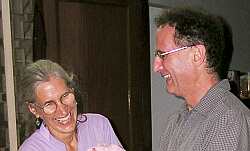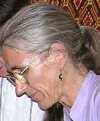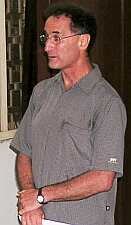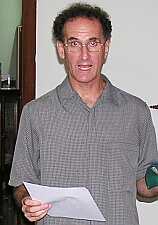 Tom Heller is a medical doctor from the United States who has worked for extended periods with HIV and AIDS in Cambodia. He and his wife Lynn are part of the Maryknoll community when they are in Cambodia. Currently they are living and working in the northwestern province of Banteay Meanchey, a poor agricultural area of the kingdom.
Tom Heller is a medical doctor from the United States who has worked for extended periods with HIV and AIDS in Cambodia. He and his wife Lynn are part of the Maryknoll community when they are in Cambodia. Currently they are living and working in the northwestern province of Banteay Meanchey, a poor agricultural area of the kingdom.
Following is Tom's account of their recent life and work. It helps to give an understanding of life in Cambodia.
November, 2005 It’s now 4 ˝ months that we’ve been in Sisophon, and we’re on the brink of deciding whether or not to stay on past December 31 and if so for how long. The rainy season is now behind us; that was a tough one. We didn’t notice when we rented our house that the house lies at a lower level than the road, and that the floor of our first floor is actually below the level of the ground around us, so our kitchen and bathroom seem to be the absolute low point, elevation-wise, in our neighborhood. Hence, we had ten floods. Each flood brought to our house a strange visitor—one time a frog, another time a crab; the last time strange fish-like creatures—-I fear they were leeches—-swam out of the pipe in the shower room as I was bailing out the remaining flood water. The rainy season also brought us rats, which are upsetting to anyone but which set off a primal fear in Lynn from which there was no escape. Our landlady, Lumpke, set out poison, which took out the most audacious rat, the one that walked right past us as we ate our dinner, but the problem is not easily controlled, as rats simply live around here and prefer the comforts of a home to the out of doors.
So what is there to decide? Under these conditions what would possess us to
stay? I have to say I have been in a wrestling match with my work, but in
the end find it compelling. More about this in a moment. As for my work, today though not exactly typical, gives a sense of what this is about. This morning I completed my chart review of patient care at the Sisophon Clinic. This has been the clinic that I’ve been most proud of, that has essentially been functioning on its own the last few months while I’ve given my attention to the other 3 sites where AIDS care is less developed. The results were disconcerting; while the clinic has enrolled over 500 patients and has started 230 on ARVs, there are many patients who have been coming to the clinic for months, have very low CD4 counts, and are still not on the ARV drugs. There have also been too many patients who have come just once and not returned. When the clinic opened, I worked closely with the two doctors who were providing the care, but since then two additional doctors have been added. One spent 6 months in an AIDS training program at Center of HOPE Hospital in Phnom Penh; the other has had no formal training but has been under the supervision of the clinic chief, who is the most skilled clinician in the province. Most of the problems in care that I noted from reviewing records had to do with the patients of these two newer doctors. Therefore, this afternoon I sat with Dr. Ouk (not his real name), the doctor who spent 6 months at Center of HOPE. First patient, #389, one of the patients whose record I had reviewed: CD4-47 (very low) in early August; quite stable, no current complaints. Dr. Ouk paged through the chart, noting that the patient’s weight is stable, and that she’s had no real complaints for some time. “What do you think?” he asked me. “What do you think, Dr. Ouk?” Dr. Ouk turned to the patient in drill mode: “What are the complications of ARVs?” The patient looked uncomfortable, but answered, “Numbness and tingling in the fingers and toes.” “What else?” “Abnormal liver enzymes.” “What else?” Dr. Ouk wasn’t about to let up. She hesitated, unable to come up with other side effects. “How are you to keep these medicines?” Dr. Ouk continued the interrogation. “If I leave home on a trip, I will keep them on my body at all times.” “When you’re at home, where will you keep them?” She didn’t know what he meant; she couldn’t answer. “Out of the reach of your children,” he responded with the correct answer. She bowed her head in defeat. “I am going to send you back to the counselor until you know the right answers.” He turned to me, “Do you agree?” “Dr. Ouk, I have to say that I am quite impressed with what she knows. It’s most unusual for someone without a medical background to even know the term, ‘liver enzymes.’ Surely, she knows that her children can’t take these medicines and will keep them out of their reach; she just didn’t know that’s the answer you were looking for. This woman has been fortunate not to get sick in the 3 months since you checked her CD4 count. She seems very motivated to me, having missed no appointments here. I’d go ahead and prescribe the medication.” Dr. Ouk paused long enough to weigh what I had said against his previous judgment. “All right.” He took out his ledger, and proudly marked off the 16th tick—“This is how many I’ve started on ARVs,” he said with some pride. I thought to myself, “Dr. Ouk, you’ve worked here twice a week for 4 months and this is the 16th patient you’ve started on ARVs??? That is what you’re here to do!” I felt terrible that despite in-services I have given here, my words and his training at Center of HOPE had not led him to act more swiftly to treat his patients.
Second patient, #345, also amongst the patients I had reviewed: CD4 101 in July; now in month 4 of treatment for extra-pulmonary tuberculosis, still not on ARVs despite monthly visits since July—same situation as the last patient with the additional problem of TB. Many AIDS patients with TB die of TB despite being on drugs that should cure them of TB. There is mounting evidence that this risk is reduced if patients are on ARVs. Again the drill began. The patient froze. He couldn’t name a single side effect of ARVs. He had no idea what Dr. Ouk was getting at when asked where he’s to keep his medication. Bunchhieng, my interpreter, asked if I wanted a piece of gum. I brushed him aside completely absorbed in the unfolding drama. This time my argument that some people can’t learn these things as abstractions, that if you actually prescribe the medicines and tell him yourself what side effects he’s likely to encounter, he will likely remember, fell on deaf ears. I could not convince him. I was tempted to say, “Dr. Ouk, you have prescribed ARVs to 16 people; I have prescribed them to hundreds. Please listen to me and do as I say.” But I didn’t. The patient was sent back to the adherence counselors for more lessons. He asked the patient to return in a month; I interrupted, unable to contain myself. No, he should come back in 2 weeks. I addressed the patient: “Dr. Ouk is rightly concerned that if he prescribes the ARVs, they can do more harm than good if you don’t take them properly. I know you can take them properly. The things you need to know are not difficult to learn. Please do not be nervous when you see the counselor. In two weeks I know you will be able to get the medicines….” The patient departed; between patients I told Dr. Ouk that his concerns must be weighed against the fact that in general Cambodians have been extremely careful to take these medications exactly as prescribed, and that we are jeopardizing the patient’s survival by delaying treatment. I think Dr. Ouk was upset by my remarks because as the next patient entered the room, his countenance became severe and he shooed the man away, telling him he was Dr. Heng’s patient. I was shocked by Dr. Ouk’s handling of the patient and sought details. Dr. Ouk is tired of having to see other doctors’ patients on his clinic day. It turns out that Dr. Heng had mistakenly scheduled this patient for tomorrow, a Tuesday, which is Dr. Heng’s usual clinic day. But this Tuesday is Water Festival, and the patient knew the clinic would be closed. He came today instead so that he wouldn’t run out of his ARVs. I told Dr. Ouk he can’t take out his frustrations on the patients. Why not just tell the patient that you will gladly see him but you need to see your scheduled patients first so please wait —what if this patient leaves in anger and doesn’t get his ARVs?—then he’ll run out of his drugs and will be facing the possibility of developing drug resistance. The patient actually acted responsibly, doing what was necessary to maintain strict adherence to his medication regimen. As it turned out, the patient did leave in anger coming from long distance at great expense. Only because I was there to make a fuss about it was he reached when he could still easily return to the clinic, and the problem was averted. Wow, so much about the art of relationship that is critical to this work. Dr. Ouk must learn not to complain in front of patients about all the patients he is asked to see. He must not make the patients feel like they are a bother. In the middle of one patient encounter, he interrupted his questioning of the patient to tell me that today there is a big international boxing match between the Cambodian champion and the champion of Korea. It took great effort not to drop my mouth in disbelief at his disregard for the circumstance of the patient in front of him. I could understand how patients might see him once and never come back even knowing that in not returning they lose the opportunity for life saving drugs. Up until now I have felt that with the Sisophon staff I have had the right blend of genuine respect and insistence on good patient care. I have felt skillful in improving the care they are providing. Today I was uncertain. At the end of the session, I asked to have a few minutes to debrief with Dr. Ouk. He indicated he was in a hurry to go, but acquiesced when I asked for just 5 minutes. I went over my major concerns. He thanked me for helping him improve his care and accepted my offer to sit with him every Monday for the next 6 or 8 weeks. I told him that I had done this with Dr. Heng and Dr. Khieu when the clinic first opened, and that I think I can help him to enjoy this work more. He agreed, but Bunchhieng thought from his deferential answers that he was very upset with what had happened today. We’ll see how this unfolds. It was 4:45. I had promised to return to the inpatient unit to monitor the status of a patient in horrible condition. The patient in Bed 8 had been there for months. He was originally hospitalized with a severe allergic reaction to TB medication consisting of severe ulcers in his mouth and breakdown of skin all over his body. Nothing that was done improved this condition, and his skin became secondarily infected with extremely foul smelling infection. His mouth and throat were so ulcerated that he could not eat and lost a large amount of weight. Several weeks ago I had been asked to see him, saw the probable hopelessness of the situation but recommended an antibiotic change and asked the nurses to turn the patient frequently so that he would not be lying on the foulest smelling infected area on his back. The nurse responded rudely to me that she had 40 patients to take care of and she couldn’t possibly do this, that she herself makes too little money and that the patient’s family should hire someone to do those things. The patient’s wife, herself HIV infected but appearing healthy, essentially had done all the nursing care for her husband for the many weeks of his hospitalization and did her best to do as I suggested. Since that visit I had checked in on the patient whenever I made rounds with Dr. Heng, though I have to say the hopelessness of his situation led me to maintain some distance, as I think was the case for the staff directly caring for him. My friend, Sartak, though, was visiting him every day. He is not a doctor, but as part of his “practice” spends time on the ward just sitting with patients. He speaks no Khmer but his presence I think brings calm to difficult situations. He had become very close to the patient in Bed 8 and the patient’s wife. Last Thursday he told me the patient was in severe pain, and asked if there were something that could be done. I knew that availability of morphine was very limited. A doctor in Mongkol Borey has been approved to prescribe it, but no one in Sisophon had gone through the special training I thought was necessary to prescribe it. I brought up the problem to Dr. Heng, who said he was able to prescribe morphine. By Sunday (yesterday) it had not yet been prescribed so last evening I went with Sartak to the hospital to arrange for its being administered. The day nurse had left and the night nurse had not yet arrived. Dr. Khieu, who was on call, came in and we discussed how to administer the drug through his I.V. and that we should do whatever was needed to provide comfort. I returned to the ward this morning to find that the I.V. had infiltrated. The patient was in a stupor, and I thought he could not survive more than 2 more days. I had the conversation with his wife that no one had yet had with her—that her husband’s infections had not responded to the treatment that had been provided, and that we could not save him. She had no sense that this was the case; she had sold all her land, $5,000 worth, in an effort to save him. Now she had nothing and she was going to lose him. She held back her tears, containing her sorrow knowing it would take all her strength to continue physically attending to her husband. Now at 4:45 the situation had worsened. He had lost control of his bowels, and had had a severe bout of diarrhea. His wife had changed him, but the new clothes were already soiled. I left to try to buy adult diapers. I was gone about 10 minutes; none of the three pharmacies near the hospital had adult disposable diapers; I returned to the ward. The patient’s wife had taken off the soiled pants and was so lovingly cleaning his bottom. I had the sense of the patient resting in her comforting and knowing hands. She had a clean kramah (Cambodian sarong) which she rapped him in; she turned him from his side to his back, and in the next instant he died. The nurse had just come in, and I was in mid sentence, telling her I thought that if the patient appeared to be in pain, the morphine should be re-administered. “Oh my goodness, he’s dead.” The nurse checked his pulse, confirmed that he had died, and retreated to her room. A crowd had gathered, consisting mainly of other AIDS patients but also the 6 year old daughter of one of the cleaners and other hospital staff I did not recognize. I called Sartak, who arrived soon thereafter with his wife Andy. To this gathered assembly all of the sorrow that can be held in one woman’s heart poured forth.
From the perspective of my work I regretted that none of the Cambodian
doctors or nurses were present. The nurse on duty remained in her room
returning an hour later to ask the patient’s wife if she wished the body
brought to the pagoda (a free service) or to her home (for which she would
have to pay). She chose the pagoda; the nurse left, not to return. While it would be presumptuous of me to offer the staff lessons in the care of dying patients, as the staff has witnessed all too many deaths and there are certainly practices that are bound by culture that I don’t fully understand, still I wished that the staff had shared in this profoundly sad and moving experience. There is much that I obviously haven’t taught regarding palliative care and the responsibility to prepare family when death seems a certainty. ...So we have much to ponder. Stay or leave. Seeds have been sown, but so much more is needed. Two clinics are up and running. A third is about to open in Poipet under the auspices of Doctors Without Borders. If I stay, I would hope to be able to help start a fourth clinic in Thmar Puok, an hour north of Sisophon, where there are hundreds more without access to ARVs. Meanwhile, across the 24 provinces of Cambodia clinics have been started and now more than 10,000 people (which I think includes the 4000 started by MSF (Doctors Without Borders)) have been started on ARVs, and, in fact, says my boss at NCHADS, we’re behind here in Banteay Meanchey compared to the “progress” made in the rest of the country. We’ll see how this all turns out and keep you posted. As we approach the week of Thanksgiving, I am reminded how often Americans returning from extended experiences abroad talk about how lucky we are to live in America. We certainly are. But having been here in Cambodia now for 1 ˝ years, I can’t help but feel uncomfortable with our privilege in the U.S.. The world is too small for the huge discrepancies between rich and poor nations to continue. Some day perhaps historians will be able to look back and remind future generations of a past in which there were so called “under-developed” or “resource poor” countries, which co-existed on the planet with countries of astounding wealth. Hopefully, the day will come when the rights we consider “inalienable” are available to all. |
Click here to read Tom Heller's postscript |
 Lynn has written
to many of you about her work at the local prison teaching English to 20
inmates between the ages of 13 and 35, to whom she gives far more than
language lessons. She offers them laughter, respect, fun, relationship.
Early on she had them learning the names of parts of the body by having the
whole lot of them doing the hokey pokey! She’s also teaching English to a
few of the local housekeepers, who work for ex-pats. She said the other day
how glad she is she didn’t give this up as she they have so much fun
together.
Lynn has written
to many of you about her work at the local prison teaching English to 20
inmates between the ages of 13 and 35, to whom she gives far more than
language lessons. She offers them laughter, respect, fun, relationship.
Early on she had them learning the names of parts of the body by having the
whole lot of them doing the hokey pokey! She’s also teaching English to a
few of the local housekeepers, who work for ex-pats. She said the other day
how glad she is she didn’t give this up as she they have so much fun
together.
 Though I’ve sat with him before, it’s probably been 3 months since I did so
because usually on Mondays and Wednesdays, when he has his clinics, I have been
at the newer clinic in Mongkol Borey. I felt negligent, but hopeful that
this little mini-lesson would help him understand that while patients must
learn the lesson that they must take every dose of their medicine every day,
and while it is good for them to have some understanding of the possible
side effects they may encounter, they do not have to have a doctor’s fund of
knowledge about these drugs; and to improve their lives, it is crucial that
the drugs be prescribed.
Though I’ve sat with him before, it’s probably been 3 months since I did so
because usually on Mondays and Wednesdays, when he has his clinics, I have been
at the newer clinic in Mongkol Borey. I felt negligent, but hopeful that
this little mini-lesson would help him understand that while patients must
learn the lesson that they must take every dose of their medicine every day,
and while it is good for them to have some understanding of the possible
side effects they may encounter, they do not have to have a doctor’s fund of
knowledge about these drugs; and to improve their lives, it is crucial that
the drugs be prescribed.
